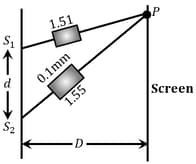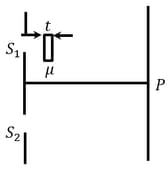Embibe Experts Solutions for Chapter: Wave Optics, Exercise 1: JEE Main - 1 February 2023 Shift 2
Embibe Experts Physics Solutions for Exercise - Embibe Experts Solutions for Chapter: Wave Optics, Exercise 1: JEE Main - 1 February 2023 Shift 2
Attempt the free practice questions on Chapter 19: Wave Optics, Exercise 1: JEE Main - 1 February 2023 Shift 2 with hints and solutions to strengthen your understanding. EMBIBE CHAPTER WISE PREVIOUS YEAR PAPERS FOR PHYSICS solutions are prepared by Experienced Embibe Experts.
Questions from Embibe Experts Solutions for Chapter: Wave Optics, Exercise 1: JEE Main - 1 February 2023 Shift 2 with Hints & Solutions
Unpolarised light is incident on the boundary between two dielectric media, whose dielectric constants are (medium –) and (medium – ), respectively. To satisfy the condition, so that the reflected and refracted rays are perpendicular to each other, the angle of incidence should be , the value of is ______.
(Given for dielectric media, )
In Young’s double slit experiment, two slits and are distance apart and the separation from slits to screen is (as shown in figure). Now if two transparent slabs of equal thickness but refractive index and are introduced in the path of beam from and respectively. The central bright fringe spot will shift by ________ number of fringes.

In a Young’s double slit experiment, the intensities at two points, for the path difference and ( being the wavelength of light used) are and respectively. If denotes the intensity produced by each one of the individual slits, then .
Two polaroids are placed in such a way that the pass-axis of polaroids are perpendicular to each other. Now, another polaroid is placed between bisecting angle between them. If intensity of unpolarised light is then intensity of transmitted light after passing through polaroid will be :
Two light waves of wavelengths and are used in Young's double slit experiment to obtain interference fringes on a screen placed away from plane of slits. If the two slits are separated by , then shortest distance from the central bright maximum to the point where the bright fringes of the two wavelength coincide will be ______ .
The displacement equations of two interfering waves are given by , respectively. The amplitude of the resultant wave is _____ .
‘’ polarizing sheets are arranged such that each makes an angle with the proceeding sheet. An unpolarized light of intensity is incident into this arrangement. The output intensity is found to be . The value of will be:
As shown in the figure, in Young's double slit experiment, a thin plate of thickness and refractive index is inserted infront of slit . The experiment is conducted in air () and uses a monochromatic light of wavelength . Due to the insertion of the plate, central maxima is shifted by a distance of . is the fringe-width before the insertion of the plate. The value of the is ______.

